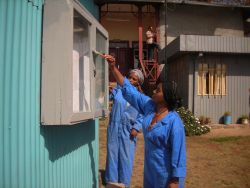
The UNESCO-UNEVOC International Centre: Who We Are | What We Do | Working With Us | Get in Touch
The UNEVOC Network: Learn About the Network | UNEVOC Network Directory
For Members: UNEVOC Centre Dashboard
Thematic Areas: Inclusion and Youth | Digital Transformation | Private Sector Engagement | SDGs and Greening TVET
Our Key Programmes & Projects: BILT: Bridging Innovation and Learning in TVET | Building TVET resilience | TVET Leadership Programme | WYSD: World Youth Skills Day
Past Activities: COVID-19 response | i-hubs project | TVET Global Forums | Virtual Conferences | YEM Knowledge Portal
Our Services & Resources: Publications | TVET Forum | TVET Country Profiles | TVETipedia Glossary | Innovative and Promising Practices | Toolkits for TVET Providers | Entrepreneurial Learning Guide
Events: Major TVET Events | UNEVOC Network News
Non-Formal Training Bakes Bread for Desperate Youth
 In 2000, I was supervising a baseline survey related to HIV/AIDS, and data collectors took me to a randomly selected house. There, I witnessed five young women who were struggling to make ends meet on the streets, but their situation was destitute.
In 2000, I was supervising a baseline survey related to HIV/AIDS, and data collectors took me to a randomly selected house. There, I witnessed five young women who were struggling to make ends meet on the streets, but their situation was destitute.
Witnessing such abject living conditions hit home with me because they are all too common occurrence among the very poor.
I decided at that point to initiate a project that would create economic and educational opportunities for young Ethiopians who have been exposed to health and economic hardships, especially those with the highest probability of exposure to HIV and AIDS. These young people are wasting their prime time struggling to survive with no opportunity to make it to high school. I strongly believed providing the appropriate skills training would make the youth productive and self-sufficient.
I focused on the town of Hawassa, one of the towns where HIV and AIDS prevalence I s high.
As I was preparing a proposal for the project, I met a man who was born in Ethiopia but now lives in the United States. He was very interested in the project proposal for Hawassa and agreed to rally his friends to raise the necessary funds upon his return to the United States.
Dedication of these people resulted in the creation of the non-profit organization Young Ethiopians Self-Sufficiency Enhancement and Re-education Association (YESSERA). The acronym YESSERA means “let us work” in local language. YESSERA's vision is to empower Ethiopian youth to transcend their limitations and realize their dreams through acquiring skills that serve the communities they live in. YESSERA focuses on youth in particular, because youth unemployment is rampant, and many are struggling to survive.
Thanks to the commitment of YESSERA members and partners, enough funding was raised to send 33 young, impoverished high-school dropouts (12 from Hawassa, 11 from Debre Berhan and 10 from Bekoji) to a vocational training school and to provide them with funding to start their own business.
Graduates from Hawassa established the “Hawassa YESSERA Construction Association”, which manufactures hollow blocks and now employs 39 people. It has won regional and national awards and recognitions. Other graduates have secured employment in private companies, NGOs and international organizations. YESSERA trainees from Bekoji (home of the world famous athlete Kenenissa Bekele) are currently in the process of establishing the “Bekoji YESSERA Construction Association”.
Moreover, YESSERA USA has been collaborating with local partners to forge ahead its vision of supporting Ethiopian youth to be self-sufficient. YESSERA is now focusing on its long-term goal of establishing a vocational training centre to scale up opportunities to young people nationwide.
Facilitation of accommodation, meals and social activities of the trainees during the original training programme was handled by my wife (Aselef Alemu) while they were attending the programme in Addis Abeba. She has been providing her service unpaid. I highly appreciate my family's support in this project and would be very happy if others establish this type of project in their countries.
Links
Ministry of Education (UNEVOC Network Online Directory)
Contact
info(at)yessera.org
Solomon Retta, fassdiscovery(at)ethionet.et
This article was submitted by Dessalegn Mulaw Yehuala, Head of TVET System Reform and Capacity Building, Ministry of Education, Ethiopia (a UNEVOC Centre)